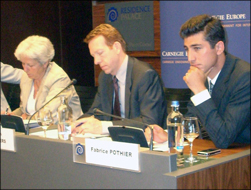Registration
You will receive an email confirming your registration.
IMGXYZ996IMGZYXTo better understand how the U.S. and the West can successfully promote democracy, Carnegie Europe convened a panel of experts to discuss the Bush administration’s past mistakes, challenges to democracy in the Middle East, and the European perspective on democracy promotion and the ‘League of Democracies.’
The Bush Administration’s Mistakes
Thomas Carothers, vice president for studies at the Carnegie Endowment, began by explaining that the Bush administration’s most serious miscalculation was to naively believe that democracy would grow naturally if autocratic regimes were overthrown. The idea that democracy would undercut extremism was similarly overly simplistic, and in reality relieved the United States of its responsibility to keep fighting extremism.
Carothers identified important tensions between Bush administration foreign policy theory and its real-world actions. One tension is between the global “Freedom Agenda,” designed to promote democracy, and the “War on Terror,” which often requires cooperation with autocracies and the use of force. These conflicting priorities are simply denied by the Bush administration. Tension also exists between the stated U.S. commitment to democracy promotion, which is idealistic, and its actual behavior toward countries like China and Russia, which is realistic and pragmatic. These tensions undermine the United States’ democracy promotion efforts.
To address these problems, Carothers argued that the next administration should dissociate democracy promotion from the use of force, push nations with whom it has friendly relations to make a better effort towards democracy, tone down forceful and theoretical rhetoric on democracy, and connect democracy promotion with energy policy. Such changes, however, are unlikely under McCain, Carothers argued. During the presidential campaign, McCain has emphasized the importance of U.S. military strength and defends the “League of Democracies” as a tool to further U.S. interests.
Democracy in the Middle East
Marina Ottaway, director of the Carnegie Endowment’s Middle East program, warned that because of the United States’ lack of credibility on democracy promotion, the next administration can expect democratic values to diminish across the Middle East. This is a “chicken or egg” dilemma: the United States needs credibility in order to successfully promote democracy, but to gain credibility, it first needs success.
To help improve its credibility in the region, the U.S. should disconnect democracy promotion from regime change, stop making promises it cannot keep, and set modest goals. Ottaway concluded that because democracy development is ultimately determined by domestic politics, the U.S. must do a better job of understanding the political dynamics within countries it hopes to influence.
Revisiting Current Democracy Promotion Policies
Michael Emerson, senior research fellow at the Centre for European Policy Studies, highlighted a number of reason why current democracy promotion policies need to be revisited:
1. The “War on Terror” forces Europe and the United States to use repression against terrorists and to cooperate with undemocratic countries.
2. Rising energy prices forces Western countries to value economic needs before democratic ones.
3. Successful autocracies like Russia and China make democracy promotion efforts more difficult by representing a seemingly successful alternative form of government.
4. The “color revolutions” in Eastern Europe and Central Asia have not produced stable democracies.
Looking to the future, Emerson argued that a ‘League of Democracies’ is a bad idea from the European point of view. Deciding who to include and who to exclude will be extremely difficult. Many countries, including large democracies, will not be interested in joining because a League would bypass and further weaken the UN. Furthermore, the Community of Democracies—a similar organization already in existence—has proven ineffective.
Emerson advocated expanding democracy promotion efforts in existing international institutions. The OECD could develop its democracy role, and the Council of Europe and NATO could develop outreach programs to support fragile democracies. As the EU expands to include more Eastern European countries, it could play a larger role in strengthening democracies in former Soviet republics. Finally, he cautioned against using excessively strong language in democracy promotion efforts.
Questions & Answers
Carothers, Ottaway and Emerson touched on the future of civil society, possible reform of international structures, and controlling the damage done by U.S. democracy promotion thus far.
